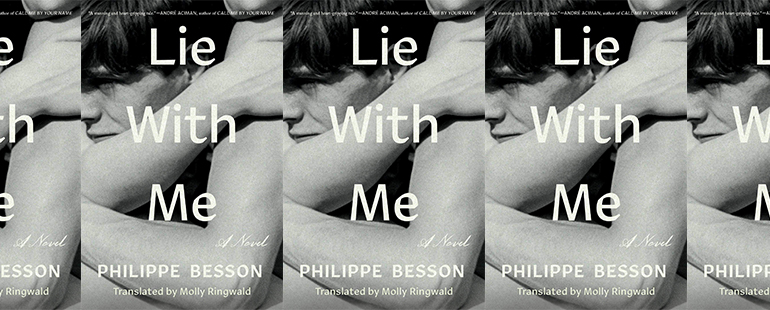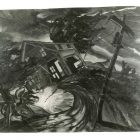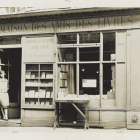Lying to Tell the Truth

Barbezieux, France, 1984. Two young men rendezvous at a “nearly empty café, just at the edge of town,” where they negotiate the terms of their love. “Thomas Andrieu,” a farmer’s son, “says that no one can know, everything must stay hidden. That is the condition: take it or leave it.” Philippe, the son of their high school’s principal, agrees to the secrecy, and to the lies. Before the boys abandon the café to consummate their desire in their locker room, Philippe asks why, out of all of the young men at their school, Thomas chose him. Their love affair will be brief and incandescent as “a firework exploding on a dark night in July,” yet Thomas’s answer, like that relationship, will remain with Philippe for the rest of his life: “Because you will leave and we will stay.”
Did this clandestine meeting ever take place? Did the real Thomas Andrieu actually utter such conspicuously literary, uncannily prescient words? Likely we will never know, for Philippe Besson’s Lie With Me (translated from the original French by Molly Ringwald) is no fact-checked work of nonfiction. Instead, this elegant and deceptively simple piece is subtitled “A Novel,” and is written in the mode or genre of “autofiction,” or fictionalized autobiography. Philippe, the narrator and protagonist, certainly shares enough in common with his author to tempt us to read through the lens of memoir. The basic plot points of Philippe’s character arc, from closeted young student in rural Charente to openly gay, internationally successful Parisian writer, correspond exactly with Besson’s own journey. And yet, at the same time, Besson clearly wants to discourage his readers from mistaking his novelistic creation for straightforward autobiography. “[My] books are fiction,” Philippe insists at one point. “Memoir doesn’t interest me.” Yes, it’s possible Philippe protests too much. Equally, though, it’s through the use of tongue-in-cheek statements like these that Besson prompts us to question our assumptions, to pay attention not only to the fictiveness of his novel, but also to the narrative quality of our own life stories.
Besson signals this metafictional skepticism from the novel’s opening page, in which an adult Philippe sits in a hotel lobby in 2007, watching people come and go: “I’ve always loved to do that, to invent the lives of strangers in passing,” he says. “It could almost be considered an obsession. I believe it started when I was a child. I remember its worrying my mother. ‘Stop with your lies!’ she would say. She used the word ‘lies’ instead of ‘stories,’ but nevertheless, it continued, and all these years later, I still find myself doing it.” It would be easy to dismiss Philippe’s mother’s stance as unsophisticated provincialism, mere parochial discomfort with an effete son’s far-flung fancies. Yet Besson is obviously also using the mother (who may or may not echo his own) to play devil’s advocate, to alert the reader to the artificiality of storytelling and, by extension, to the fictiveness inherent in the stories we tell ourselves about ourselves.
After this brief prologue, Philippe’s narrative rewinds to the year 1984, when he and Thomas are seventeen, just before their relationship begins. “I’m a student in terminal C at the Lycée Elie Vinet de Barbezieux,” Philippe tells us, and then, puzzlingly, immediately contradicts himself: “Barbezieux doesn’t exist.” Perhaps by this contradiction, Philippe means to suggest that the Barbezieux of his youth has disappeared—“who remembers the C terminals? They say ‘S’ today, I think”—or perhaps he is intimating that the Barbizeaux of Lie With Me only recreates the town as imperfectly as photographs capture sunsets or maps capture mountains. Or, indeed, perhaps Philippe is an unreliable narrator, misremembering, and the terminals were always labeled “S.” At any rate, the first-person narrative voice, always the adult Philippe’s, continues to skip back and forth through time, often editorializing around moments focalized through his seventeen-year-old self’s point of view, as when Philippe observes, “I am this young man there, in the winter of Barbezieux.” Lines like these, which on a purely semantic level test logic, function to draw attention to the separate yet somehow twinned consciousnesses of the author and his narrator-protagonist.
The triple entendre of the title unifies these metafictional games into a single thematic conceit, that of lying as lovemaking as storytelling. Most obviously, the title refers to the physical act of lying with another to make love, as Philippe and Thomas do, repeatedly, in unflinchingly painted scenes (Philippe tells us, “I let myself grow in his mouth . . . I’m struck by his voracity. He’s like a ravenous child who has just been given food and prefers to choke on it”). Secondly, the title refers to the deceptions that protect Thomas and Philippe’s secret affair, as when the boys are almost caught lying naked together in bed by Philippe’s mother. To avoid catastrophe, Philippe pretends they are working on a school project (“She doesn’t dare to push open the door. In the end we are saved by my ability to invent plausible lies”). And finally, most sophisticatedly, the title implicates the novel’s audience by referring to fictionalization itself, to the narrative acts of remembering and misremembering, fantasizing and imagining, which somehow tell us the truth of who we are even when they lie. After all, to illustrate the paradox of the truthful lie, what finer metaphor could there be than that of two young people, compelled by circumstance as if by fate to deceive their friends and family, precisely in order to safeguard the truths they can entrust only to each other?
For Philippe, and presumably also for Besson, storytelling—the crafting of the honest lie, the placement of the “art” in “artifice”—is as much an erotic pursuit as sex itself. Long after their affair has ended and Thomas and Philippe have gone their separate ways, Philippe reflects upon the possibility that the whole thing could have been “a complete invention”: “As you already know, I invented stories all the time, with so much authenticity that people usually ended up believing me (sometimes even I was no longer able to disentangle the true from the false). Could I have made this story up from scratch? Could I have turned an erotic passion into an obsession? Yes, it’s possible.” For Philippe and for the novel in a broader metaphysical sense, desire is the experience of need that necessitates sexuality and storytelling both. “You can’t fight necessity,” he tells us. “If you do, necessity will win.” Everyone knows that love renders to eros what is the god’s, but in the absence of love, in “the pain of missing someone,” Philippe finds another, sublimated way of ameliorating his yearnings. “Later I will write about this longing,” he says, “the intolerable deprivation of the other . . . I wonder sometimes if I have ever written of anything else.”
“Because you will leave and we will stay.” Thomas’s prediction, if not quite Greek in its stakes, has a prophetic quality nonetheless, and in the end it does come true. Like Besson before him, Philippe outgrows Barbezieux. He goes to university and becomes a novelist, making good on the promise of his middle-class upbringing. Thomas, by contrast, is left to inherit the family farm, to marry a Spanish girl, to sire a son, to live a lie in no clever, paradoxical sense, and finally, after abandoning his family in a too-late attempt to live freely and openly, to take his own life. This tragic news is relayed to Philippe by Thomas’s son, Lucas.
He is the one who speaks again: What about you? You will write about this story, won’t you? You won’t be able to stop yourself.
I repeat that I never write about my life, that I’m a novelist.
He smiles: Another one of your lies, right?
I smile back at him. Will you allow me to write about it?
He shrugs: I have nothing to forbid.
Lucas’s parting gift to Philippe is an old letter, never sent, discovered in Thomas’s wardrobe after his death, and addressed, of course, to Philippe. “It was love,” Thomas writes, and offers a blue sort of blessing: “tomorrow, there will be a great emptiness. But we could not continue—you have your life waiting for you, and I will never change.” Lie With Me, dedicated “In Memory of Thomas Andrieu, 1966-2016,” is surely Philippe’s answer to this letter, Besson’s way of sustaining desire and keeping love alive. “Perhaps writing is a good means of survival,” Philippe muses. “A way of not forgetting the ones who have disappeared.” A way of using lies not to hide, but finally, to tell the truth.



